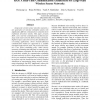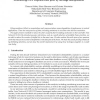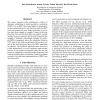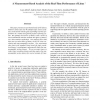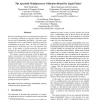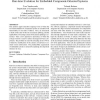166
click to vote
RTAS
2002
IEEE
15 years 7 months ago
2002
IEEE
Large-scale wireless sensor networks represent a new generation of real-time embedded systems with significantly different communication constraints from traditional networked sys...
113
click to vote
RTAS
2002
IEEE
15 years 7 months ago
2002
IEEE
Delay variations (jitter) in computations and communications cause degradation of performance in control applications. There are many sources of jitter, including variations in ex...
128
click to vote
RTAS
2002
IEEE
15 years 7 months ago
2002
IEEE
Dynamic voltage scaling (DVS) is an effective low-power design technique for embedded real-time systems. In recent years, many DVS algorithms have been proposed for reducing the e...
108
click to vote
RTAS
2002
IEEE
15 years 7 months ago
2002
IEEE
We have implemented an object-oriented real-time database system called BeeHive. Using BeeHive, the performance of two data-deadline cognizant scheduling policies, called EDDF and...
144
click to vote
RTAS
2002
IEEE
15 years 7 months ago
2002
IEEE
This paper provides two contributions to the study of programming languages and middleware for real-time and embedded applications. First, we present the empirical results from ap...
100
click to vote
RTAS
2002
IEEE
15 years 7 months ago
2002
IEEE
The paper presents some preliminary results on dynamic scheduling of model predictive controllers (MPCs). In an MPC, the control signal is obtained by on-line optimization of a co...
104
click to vote
RTAS
2002
IEEE
15 years 7 months ago
2002
IEEE
This paper presents an experimental study of the latency behavior of the Linux OS. We identify major sources of latency in the kernel with the goal of providing real-time performa...
RTAS
2002
IEEE
15 years 7 months ago
2002
IEEE
108
click to vote
RTAS
2002
IEEE
15 years 7 months ago
2002
IEEE
Real-time scheduling theory has developed powerful tools for translating conditions on aggregate system utilization into per-task schedulability guarantees. The main breakthrough ...
117
click to vote
ICSM
2002
IEEE
15 years 7 months ago
2002
IEEE
This position paper describes ongoing work in which the Java-based SEESCOA component system is extended with functionality for run-time evolution. First, an assessment is made of ...
